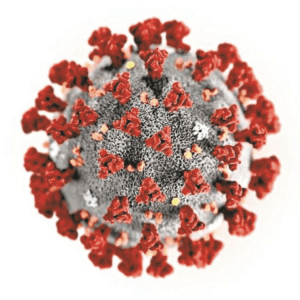What is COVID-19?
Coronavirus disease (COVID-19) is an infectious disease caused by a newly discovered coronavirus.
Former President Donald Trump declared COVID-19 a national emergency on March 13, 2020.
Since the start of the pandemic, over 587,000 Americans have died from the virus and related complications, and nearly 4 million worldwide.
Since the start of the pandemic, the CDC has released guidelines to best protect yourself from COVID-19.

New Guidelines for Fully Vaccinated Individuals
In general, people are considered fully vaccinated:
- 2 weeks after their second dose in a 2-dose series, such as the Pfizer or Moderna vaccines, or
- 2 weeks after a single-dose vaccine, such as Johnson & Johnson’s Janssen vaccine
If you’ve been fully vaccinated:
- You can resume activities that you did prior to the pandemic without wearing a mask or staying 6 feet apart,
- except where required by federal, state, local, tribal, or territorial laws, rules, and regulations, including local business and workplace guidance.
- If you travel in the United States, you do not need to get tested before or after travel or self-quarantine after travel.
- You need to pay close attention to the situation at your international destination before traveling outside the United States.
- You do NOT need to get tested before leaving the United States unless your destination requires it.
- However, you still need to show a negative test result or documentation of recovery from COVID-19 before boarding an international flight to the United States.
- You should still get tested 3-5 days after international travel.
- However, you do NOT need to self-quarantine after arriving in the United States.
Protect Yourself Against COVID-19
How to Slow the Spread of COVID-19
Wear a Mask
- Everyone 2 years and older should wear masks in public.
- Masks should be worn in addition to staying at least 6 feet apart, especially around people who don’t live with you.
- If someone in your household is infected, people in the household should take precautions including wearing masks to avoid spread to others.
- Wash your hands or use hand sanitizer before putting on your mask.
- Wear your mask over your nose and mouth and secure it under your chin.
- Fit the mask snugly against the sides of your face, slipping the loops over your ears or tying the strings behind your head.
- If you have to continually adjust your mask, it doesn’t fit properly, and you might need to find a different mask type or brand.
- Make sure you can breathe easily.
Stay 6 feet away from others
- Inside your home: Avoid close contact with people who are sick.
- If possible, maintain 6 feet between the person who is sick and other household members.
- Outside your home: Put 6 feet of distance between yourself and people who don’t live in your household.
- Remember that some people without symptoms may be able to spread the virus.
- Stay at least 6 feet (about 2 arm lengths) from other people.
- Keeping distance from others is especially important for people who are at higher risk of getting very sick.
Get Vaccinated
- Authorized COVID-19 vaccines can help protect you from COVID-19.
- You should get a COVID-19 vaccine when it is available to you.
- Once you are fully vaccinated, you may be able to start doing some things that you had stopped doing because of the pandemic.
Avoid crowds and poorly ventilated spaces
- Being in crowds like in restaurants, bars, fitness centers, or movie theaters puts you at higher risk for COVID-19.
- Avoid indoor spaces that do not offer fresh air from the outdoors as much as possible.
- If indoors, bring in fresh air by opening windows and doors, if possible.
Wash your hands often
- Wash your hands often with soap and water for at least 20 seconds especially after you have been in a public place, or after blowing your nose, coughing, or sneezing.
- It’s especially important to wash:
- Before
- Eating or preparing food
- Touching your face
- After
- Using the restroom
- Leaving a public place
- Blowing your nose, coughing, or sneezing
- Handling your mask
- Changing a diaper
- Caring for someone sick
- Touching animals or pets
- Before
- If soap and water are not readily available, use a hand sanitizer that contains at least 60% alcohol. Cover all surfaces of your hands and rub them together until they feel dry.
- Avoid touching your eyes, nose, and mouth with unwashed hands.
